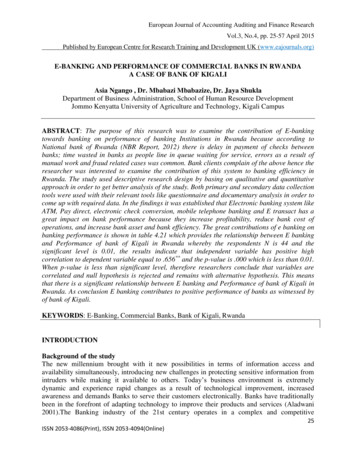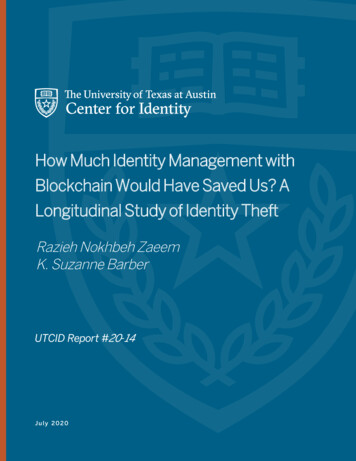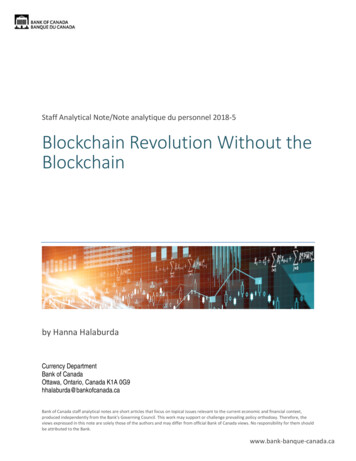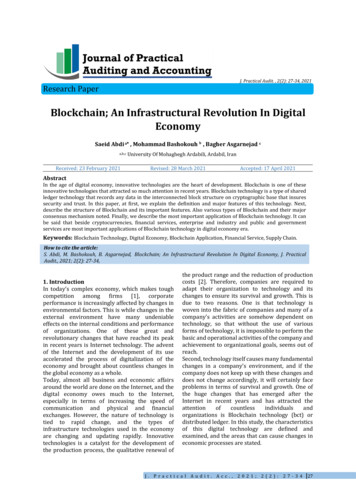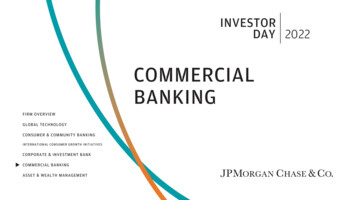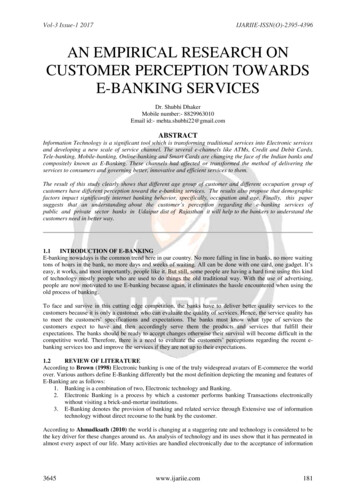
Transcription
Capital Markets Investment BankingBlockchain in the InvestmentBank
ContentWhat does crypto technology mean for the investment bank?3What are the key questions to be answered?4Accenture’s point of view5How Accenture can help7Relevant Accenture experience72
What does crypto technology mean for theinvestment bank?Blockchain is a disruptive technology platform that uses cryptography and a distributedmessaging protocol to create a shared ledger between trading counterparties. The idea is to allowfor a simple transfer of asset ownership or more complex transactions using “smart contracts”.The data on the ledger is pervasive, persistentand creates a reliable “transaction cloud”as this transaction data cannot be lost orcorrupted by any of the participants.There are many possible applications ofBlockchain technology in investmentbanking. Suggested use cases in testingmode include Know-Your-Customer andAnti-Money Laundering data sharing, tradesurveillance, regulatory reporting, collateralmanagement, trading, settlement and clearing.Blockchain thus has the potential to maketrading processes far more efficient, toAutomationExecution is open to the Internet and settlement isautomatic; can run without any human interference andunder the control of an incorruptible set of business rules.It also has the potential of disruptingincumbent business models because of thechanges in the figure below.Smart ControlsComputer protocols facilitate, verify, or enforcethe negotiation or performance of a contractand obviate the need for contractual clause.Secure Transaction Ledger DatabaseSecure transaction ledger database which is sharedby all parties in an established, distributed network.“Trusted” Third Party EliminationAssets are held ”in the cloud” and are tiedto their owners’ identities rather thaninstitutional custodians; exchange ofinformation without third-party validation.Virtual markets are democratic and cancircumvent the traditional financial hierarchy.improve regulatory control and to eliminateunnecessary intermediaries.Better customerexperience withreduction in costCost ReductionReduction of infrastructure as wellas transaction costs associatedwith contracting.Eliminates Error HandlingEliminates error handling and reconciliation;provides a real time track and trace audit trail.3
What are the key questions to be answered?Technology decision makers will need to validate the following questions before looking atBlockchain and its use in an investment bank: Is there any regulatory framework to definea new industry standard? Will counterparties need to be identifiableand linked to a legal entity? What are the new value drivers for marketleadership in using the Blockchain technology? How will we establish a legal frameworkacross both smart and traditional contracts? Can the ownership of a financial asset otherthan crypto currency be transferred usingthe distributed ledger concept with certaintyand finality? How is the ledger version controlled? Can a smart contract be programmed toexecute the lifecycle events of a financialasset? Can that financial asset be legally enshrinedin computer code as a smart contract, suchthat any legal dispute could be decided byway of how the code of the smart contractexecutes on a distributed network?4 Is there a marketplace to performthe transactions? Should access to the Blockchain becontrolled or open? How do these marketplaces attract liquidity? What is the true potential to reduce the costof execution? Are digital wallet and cold storageproviders posing competitive threatsto financial institutions by way ofenabling individuals to be the custodianof their own crypto currency? How to remain competitive given the opensource nature of the technology? Technical scalability. How can we besure the infrastructure can be scaledto accommodate a mass market globaltransaction rate? How to integrate analytical tools in orderto process, review and audit meta data fromanonymous transactions following SECRule 613?
Accenture’s current point of viewBlockchain technology was originally leveraged by cryptocurrencies whose popularity gaverise to the idea of Blockchains as a means of building consensus. To that end, there are manyfunctions within capital markets and other industries which can be simplified and enhanced bythe order and validation in a distributed ledger via Blockchains.Seizing the potential opportunity, banks andventure capitalists have begun investing inBlockchain technology to leverage financialassets. The view is that counterparty risk needsto be minimized, settlement times reduced,contractual term performance improved andtransparency for regulatory reporting increased.loans and private investments. Ultimately theability to settle currency, equity, and fixedincome trades almost instantaneously throughpermissioned distributed ledgers may createan even greater opportunity for banks to driveefficiency and potentially create newasset classes.A number of announcements have beenmade by companies investing in the space,both directly and by taking stakes in existingstart-ups, i.e. research and developmentlabs. Examples include investments in Ripple,LedgerX, Coinbase, as well as UBS’s announcedcreation of an innovation lab at Level39 – butthis is just the beginning1. Accenture believesthat, although the potential of the technologyis only just emerging, Blockchains will becomethe critical backbone of the future capitalmarkets infrastructure.The other near term impact of Blockchaintechnology adoption for distribute ledgers willlikely be the adoption of smart contracts ascounterparties agree on contractual terms viacomputer protocols. Transactions where nodescan monitor and detect contracts for changesof ownership and contract rules would begreatly enhanced in terms of efficiency asmany contractual clauses could be automatedand security enhanced.In terms of a go-to-market strategy, we seean intermediary stage of investment banksrunning private (permissioned) Blockchainsolutions. This is until regulation or legislationcatches up to the Blockchains, wherecapital markets players are confident in thetypes of services they can offer on a public(permissionless) Blockchain. Examples couldbe externally interacting digital wallets andexchanges. The initial impacts will likely berelated to asset classes where there is nocentral trading and/or clearing mechanism,such as FICC derivatives derivatives, syndicatedFrom Accenture’s vantage point, the maturingBlockchain landscape has the opportunity tobe a tremendous source of innovation whichrequires further due diligence for definingindustry standards with regards to settlement,counterparty and other transactional risksinvolved. We favor regulation at the point ofentry/exit to cryptocurrency networks (digitalcurrency wallets and digital currency tradingexchanges) in a way that secures transactionsbut doesn’t stifle the innovation. We believe anagile approach allowing regulatory evolutionin parallel to the maturing innovation offeringwill be key to maintaining that balancebetween security and future mass marketBlockchain scalability.While the technical execution via variousexisting Blockchain platforms seems to beconfirmed for various financial instruments, anumber of questions as listed above remainsto be evaluated. Accenture believes that thepotential effect of leveraging Blockchaintechnology within the capital markets industrywill be significant if the existing legacytechnology, operations and infrastructurelandscape within the established capitalmarkets players is considered. The numberof applications within outside banks will bereduced as the Blockchain transaction containsall relevant information for the successfultransfer of assets and/or related contracts.1. -bitcoin-investors/; -technology-in-london-lab/5
6
How Accenture can helpAccenture can help to assess the Blockchain technology evaluation process by setting uptechnical sandbox “proof of concepts” in an agile “Hot House” approach. Agile proof of valuemeans testing actual technology concepts in a near-reality technical environment, failingfast and working around a hypothesis-based collaborative approach.A “Hot House” provides the mechanism toquickly explore an idea and promote earlydelivery through rapid prototyping leveragingour Accenture Technology Lab capabilities.We may simulate the lifecycle of a financialinstrument in a smart contract executed overa distributed ledger and demonstrate thespecific technology or operations impactsof Blockchain which are to be measured bydefined KPI’s. Accenture can also performanalysis of how to integrate this newtechnology seamlessly with the existinginfrastructure.Relevant Accenture experienceThe combination of Accenture’s capital markets technology experience in corporate bondssettlement and clearing, use case-applied Blockchain technology innovation driven out ofour Technology Labs, and access to a network of alliances and FinTech technology providersmay offer clients an excellent subject matter advisor foundation.Crypto currency and Blockchaintechnology experienceIn our Accenture Technology Labs, weare working with a number of Blockchaintechnology companies for innovative solutionsto leverage distributed ledgers within capitalmarkets. While there are many initiatives beingexplored, we would value the opportunityto showcase our technical and conceptualcapabilities for virtual corporate bond issuance.Additionally, in collaboration with cryptocurrency start-ups, Accenture has beendeveloping a digital payment architecture,various use cases and technical prototypes. Wecan help our clients that are thinking aboutexploiting crypto currencies to understand thecompetitive environment while also helping toidentify how to embed crypto currencies intotheir as-is operating models and IT systems, aswell as the implications and change impact ofdoing so.Accenture is a partner of the FinTechInnovation Lab in New York, London and HongKong (www.fintechinnovationlab.com) and iscollaborating with a range of innovators whoseknowledge and expertise we can tap intoduring the course of our projects.7
ContactAbout AccentureSigrid SeiboldAccenture is a global management consulting,technology services and outsourcing company,with more than 323,000 people servingclients in more than 120 countries. Combiningunparalleled experience, comprehensivecapabilities across all industries and businessfunctions, and extensive research on theworld’s most successful companies, Accenturecollaborates with clients to help thembecome high-performance businesses andgovernments. The company generated netrevenues of US 30.0 billion for the fiscal yearended Aug. 31, 2014. Its home page iswww.accenture.com.Managing Director, Capital Markets Digitalsigrid.seibold@accenture.comDavid TreatManaging Director, Capital Marketsdavid.b.treat@accenture.comSarah Fieldersarah.l.fielder@accenture.comKathleen Breitmankathleen.breitman@accenture.comLearn more about AccentureCapital Markets his report has been prepared by and isdistributed by Accenture. This document isfor information purposes. No part of thisdocument may be reproduced in any mannerwithout the written permission of Accenture.While we take precautions to ensure thatthe source and the information we base ourjudgments on is reliable, we do not representthat this information is accurate or completeand it should not be relied upon as such.It is provided with the understanding thatAccenture is not acting in a fiduciary capacity.Opinions expressed herein are subject tochange without notice.Copyright 2015 AccentureAll rights reserved.Accenture, its logo, andHigh Performance Deliveredare trademarks of Accenture.11-11112/15-2250
to be evaluated. Accenture believes that the potential effect of leveraging Blockchain technology within the capital markets industry will be significant if the existing legacy technology, operations and infrastructure landscape within the established capital markets players is considered. The number of applications within outside banks will be


